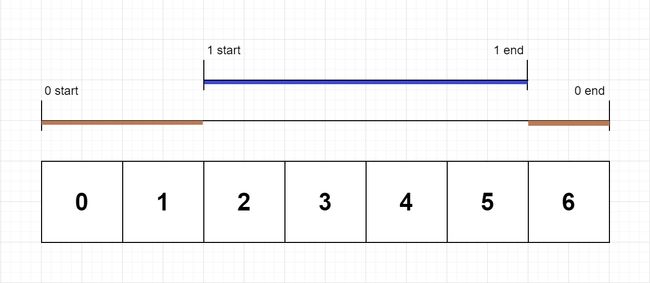LeetCode每日一题(636. Exclusive Time of Functions)
On a single-threaded CPU, we execute a program containing n functions. Each function has a unique ID between 0 and n-1.
Function calls are stored in a call stack: when a function call starts, its ID is pushed onto the stack, and when a function call ends, its ID is popped off the stack. The function whose ID is at the top of the stack is the current function being executed. Each time a function starts or ends, we write a log with the ID, whether it started or ended, and the timestamp.
You are given a list logs, where logs[i] represents the ith log message formatted as a string “{function_id}:{“start” | “end”}:{timestamp}”. For example, “0:start:3” means a function call with function ID 0 started at the beginning of timestamp 3, and “12” means a function call with function ID 1 ended at the end of timestamp 2. Note that a function can be called multiple times, possibly recursively.
A function’s exclusive time is the sum of execution times for all function calls in the program. For example, if a function is called twice, one call executing for 2 time units and another call executing for 1 time unit, the exclusive time is 2 + 1 = 3.
Return the exclusive time of each function in an array, where the value at the ith index represents the exclusive time for the function with ID i.
Example 1:
Input: n = 2, logs = [“0:start:0”,“1:start:2”,“15”,“06”]
Output: [3,4]
Explanation:
Function 0 starts at the beginning of time 0, then it executes 2 for units of time and reaches the end of time 1.
Function 1 starts at the beginning of time 2, executes for 4 units of time, and ends at the end of time 5.
Function 0 resumes execution at the beginning of time 6 and executes for 1 unit of time.
So function 0 spends 2 + 1 = 3 units of total time executing, and function 1 spends 4 units of total time executing.
Example 2:
Input: n = 1, logs = [“0:start:0”,“0:start:2”,“05”,“0:start:6”,“06”,“07”]
Output: [8]
Explanation:
Function 0 starts at the beginning of time 0, executes for 2 units of time, and recursively calls itself.
Function 0 (recursive call) starts at the beginning of time 2 and executes for 4 units of time.
Function 0 (initial call) resumes execution then immediately calls itself again.
Function 0 (2nd recursive call) starts at the beginning of time 6 and executes for 1 unit of time.
Function 0 (initial call) resumes execution at the beginning of time 7 and executes for 1 unit of time.
So function 0 spends 2 + 4 + 1 + 1 = 8 units of total time executing.
Example 3:
Input: n = 2, logs = [“0:start:0”,“0:start:2”,“05”,“1:start:6”,“16”,“07”]
Output: [7,1]
Explanation:
Function 0 starts at the beginning of time 0, executes for 2 units of time, and recursively calls itself.
Function 0 (recursive call) starts at the beginning of time 2 and executes for 4 units of time.
Function 0 (initial call) resumes execution then immediately calls function 1.
Function 1 starts at the beginning of time 6, executes 1 unit of time, and ends at the end of time 6.
Function 0 resumes execution at the beginning of time 6 and executes for 2 units of time.
So function 0 spends 2 + 4 + 1 = 7 units of total time executing, and function 1 spends 1 unit of total time executing.
Constraints:
- 1 <= n <= 100
- 1 <= logs.length <= 500
- 0 <= function_id < n
- 0 <= timestamp <= 109
- No two start events will happen at the same timestamp.
- No two end events will happen at the same timestamp.
- Each function has an “end” log for each “start” log.
创建一个栈保存所有的 start, 每遇到一个 start 则结算从前一个 start 到当前 start 的运行时间, 这个时间加到前一个 start 的 function 的运行时间上, 因为从这一刻起, 前一个 start 的 function 等于不再执行了。如果遇到 end 则直接结算当前 function 的运行时间(当前 end 时间-栈顶 start 时间), 结算完还需要修改前一个 start 的时间,因为从当前 end 的时间起, 前一个 start 的又开始运行了。注意检查栈为空的情况, 还有,这一切的前提是建立在 logs 是按时间轴来进行记录的条件下的
impl Solution {
pub fn exclusive_time(n: i32, logs: Vec<String>) -> Vec<i32> {
let mut ans = vec![0; n as usize];
let mut stack: Vec<(i32, i32)> = Vec::new();
for log in logs {
let group: Vec<String> = log.split(":").map(|v| v.to_owned()).collect();
let num = group[0].parse::<i32>().unwrap();
let typ = group[1].clone();
let t = group[2].parse::<i32>().unwrap();
if typ == "start" {
if let Some(prev) = stack.pop() {
ans[prev.0 as usize] += t - prev.1;
stack.push(prev);
}
stack.push((num, t));
continue;
}
let prev = stack.pop().unwrap();
ans[prev.0 as usize] += t - prev.1 + 1;
if let Some(mut p) = stack.pop() {
p.1 = t + 1;
stack.push(p);
}
}
ans
}
}
